Have you ever noticed how people only call you after they have already decided you "look right" for the job?
That choice rarely comes from a single conversation anymore. It comes from what they see when they search your company name, browse your website, or scan your welding capabilities online. They judge the quality of your work before they hear your voice. And for many welding manufacturers, that moment is where good opportunities quietly slip away.
Marketing in welding is about making your skill, precision, and reliability visible to buyers who care about getting it right the first time.
This guide walks through how welding manufacturers can build marketing that boosts sales, strengthens reputation, and supports long-term scale.
How Welding Manufacturing Marketing Actually Works?
Marketing for welding manufacturers works best when it mirrors how your buyers think and decide. They are not looking for slogans. They are looking for confidence. They want to know you understand their specs, their timelines, and their quality expectations.
Strong welding marketing focuses on a few core realities:
Buyers Want To See Proof
Finished projects, weld quality, process documentation, and real applications carry more weight than sales language.
Decision-Makers Value Clarity Over Creativity
Clear explanations of your capabilities, materials, and standards eliminate hesitation.
Visibility Shapes Trust
The easier it is to find and understand your expertise, the more likely buyers are to shortlist you.
Consistency Builds Reputation
When your messaging matches your actual work, it strengthens belief in your reliability.
When marketing for welding manufacturing reflects the same care and precision you apply on the shop floor, it creates a steady flow of clients who already respect your work before the first conversation even begins. That is what turns marketing from an afterthought into a growth engine for welding manufacturers.
Why Marketing is Your Secret Weapon in the Welding World?
The real challenge in running a welding shop is getting the right customers to notice your business.
Many welding manufacturers still wait for referrals or repeat contracts, but buyers today search online, compare options, and choose based on credibility.
If your company doesn’t appear in those searches, you lose opportunities.
Common Struggles in Customer Acquisition
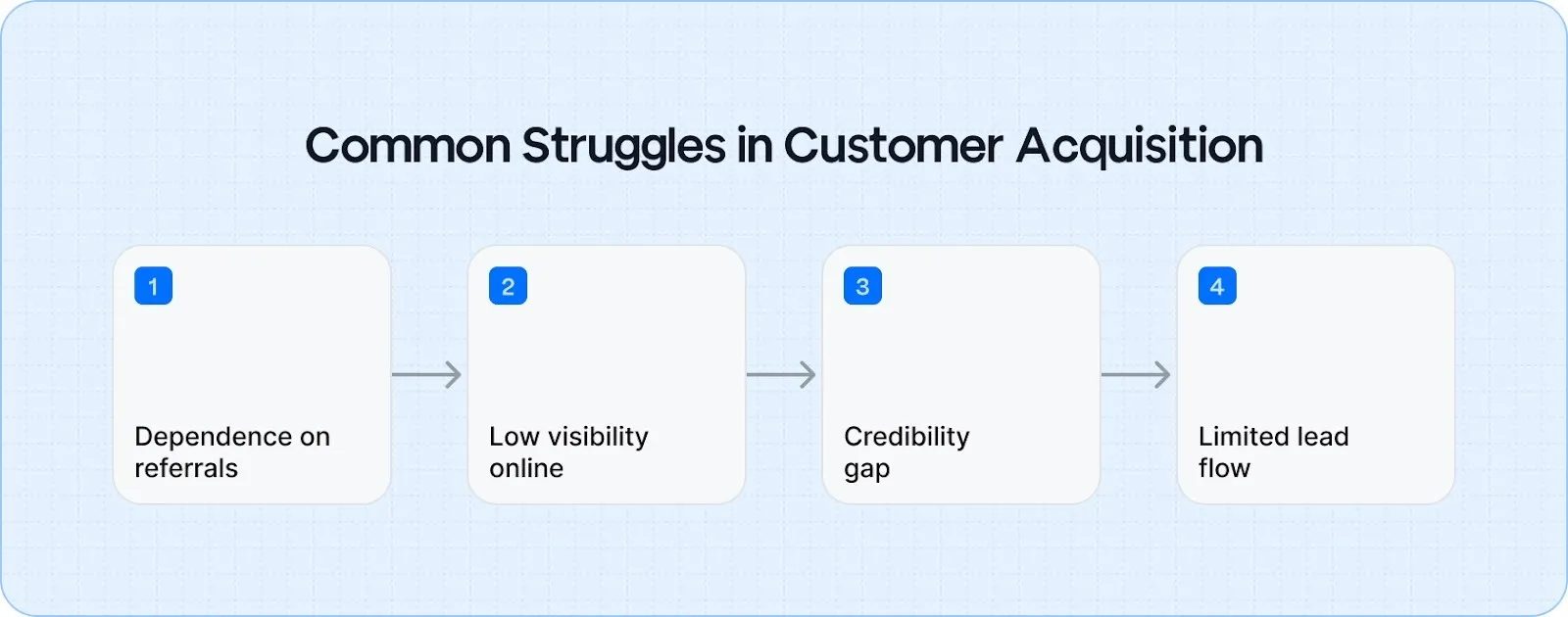
Welding manufacturers face hurdles when it comes to winning new business:
- Dependence on referrals: Work slows down when old contracts end.
- Low visibility online: Competitors appear in searches while your shop remains hidden.
- Credibility gap: Buyers look for proof like certifications, case studies, or technical expertise.
- Limited lead flow: Without digital outreach, inquiries remain unpredictable.
The Numbers That Prove the Impact
Marketing is more than a support function; it drives measurable results for manufacturers.
- 70% of companies report positive ROI from content marketing, according to a report by Content Marketing Institute.
- Content marketing costs 62% less than traditional marketing while generating three times the number of leads.
- 73% of B2B marketers use content marketing as part of their marketing strategy.
8 Marketing Strategies to Strengthen Your Welding Manufacturing Business
The shop floor isn’t the only place business happens anymore; buyers start their search online. If your welding business isn’t visible there, you’re losing contracts before you even get a chance to bid.

Building a strong online presence ensures potential clients can find you, trust you, and contact you.
SEO (Search Engine Optimization) for Welding Businesses
Search engines are often the first stop for buyers looking for welding services. With the right SEO approach, your shop can show up at the top when they search.
- Keyword strategy: Focus on welding-specific keywords that match what buyers type, like “industrial welding services” or “pipe welding contractors.”
- On-page optimization: Use service descriptions, project showcases, and certifications to highlight your capabilities clearly.
- Local SEO: Claim and update your Google Business Profile to attract nearby clients searching “welding near me.”
- Pro tip: Adding location-based keywords like “structural welding in Pune” or “fabrication shop in Texas” makes you stand out locally.
- Link building: Earn trust by getting mentioned in industry directories or supplier listings.
Pro Website Design
Your website is often the first impression of your shop. A cluttered, outdated site can turn buyers away even before they see your work.
- Key features: Keep it simple, clear, and structured so clients can quickly see what services you provide.
- Mobile optimization: More than half of B2B searches now happen on phones. If your site doesn’t load well, you’re missing those leads.
- Example: One welding company redesigned its website with project galleries and certifications upfront and saw a significant increase in RFQ submissions within three months.
Once your shop is visible online, the next step is amplifying your brand where clients spend their time, social media.
Social Media for Networking & Sales
Different platforms serve different goals. Understanding what to post and where helps you reach the right people.
LinkedIn: Ideal for B2B connections. Use it to connect with plant managers, procurement officers, and contractors who often need welding services. Share case studies, project highlights, or technical know-how to position your shop as an authority.

- Facebook & Instagram: Perfect for visual storytelling. Photos of finished projects, short reels of welding in action, and client testimonials build credibility with both individuals and small businesses.
- YouTube: A great way to showcase your process. Tutorials, demos, or behind-the-scenes shop tours prove your expertise and can rank in Google searches, giving you long-term visibility.
- Example in action: A welding shop shared Instagram Stories of a large custom fabrication project. Within a week, three new clients reached out—proof that showing your process can directly generate business.
Content Strategy for Social Media
Consistency and authenticity beat fancy production every time. Buyers want to see real work, real results, and real people.
- Content that connects: Share success stories, highlight client testimonials, or post time-lapse videos of complex welds being completed. These give prospects confidence in your capabilities.
- Hashtags & trends: Industry hashtags like #weldingservices or #fabrication help buyers discover your content. Jumping on trending formats (like quick reels or shorts) can amplify reach.
- Paid ads: When organic reach slows down, targeted ads can put your services directly in front of buyers in your region or industry. For example, you can run a campaign targeting “manufacturing plant managers” within 50 miles of your shop.
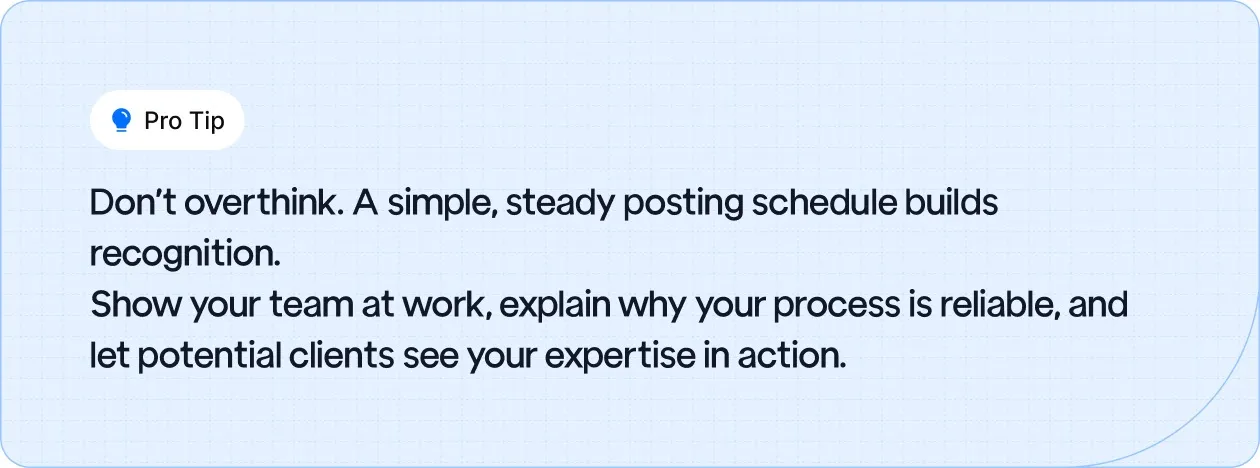
Social media builds visibility and trust. In an industry where many buyers choose based on reputation, your online presence can act as proof of quality.
With social media making your brand visible and trusted, the next step is to drive faster, more targeted results through paid advertising.
Content Marketing Strategies for Growth
Think of content marketing as your shop’s steady welding arc; it builds trust slowly, but the bond it creates lasts for years. Unlike quick ads, content keeps working long after you’ve posted it.
Ways to make it work:
- Blogs & case studies: Write posts like “Why Custom Welding Solutions Are Key for Manufacturing Success” and back them up with case studies from real projects.
- Ebooks & whitepapers: Offer guides like “The Ultimate Checklist for Industrial Welding Projects” in exchange for email sign-ups.
- Email marketing: Send newsletters with project updates, seasonal offers, or “shop tips” that keep you top-of-mind.

Content builds authority. Now, let’s talk about how to turn those readers into loyal, paying clients.
Turning Your Welding Services Into Business Relationships
Winning a job is one thing. Turning that job into a long-term contract is where the real profit lies. The strongest welding shops treat relationships like assets.
Here’s how to make it happen:
1. Customer service excellence: Personalize your follow-up. Example: one welding shop turned a one-off pipe repair into a 3-year contract simply by checking in regularly.
2. Testimonials & reviews: Nothing beats real client feedback. Ask for reviews on Google or LinkedIn and proudly display them on your site.

3. Loyalty programs: Reward repeat business. Offer referral discounts or early access to scheduling slots for top clients.

With stronger relationships, you’ll want to track what’s really working behind the scenes.
Tracking Your Welding Marketing Success
Think of analytics like the gauges on your welding machine. They tell you if things are on track or if something needs adjusting.
Metrics to track:
- Website traffic: Are more buyers visiting your site?
- Leads: How many RFQs or inquiries come in each month?
- ROI: What revenue can you connect directly to marketing spend?
Tools to use:
- Google Analytics for website performance.
- Social media insights for post engagement.
- Email marketing stats (open rates, clicks).

Once you know what’s working, it’s time to shift gears and bring in fast results with PPC ads.
Pay Per Click (PPC)
Sometimes you can’t wait months for SEO to kick in. That’s where PPC steps in; it’s like striking an arc that produces instant heat.
Your best options:
- Google Ads: Capture local buyers searching “welding repairs in [Your City].” One small shop used this tactic and doubled inquiries in a month.
- LinkedIn Ads: Target B2B buyers like plant managers or contractors who need industrial welding partners.
- Remarketing: Show tailored ads to visitors who viewed your site but didn’t contact you.

PPC brings fast leads, but to play the long game, your content is what keeps your business growing year after year.
Sustainable Growth for Your Welding Business
Success in welding is about making sure the right clients can find you, trust you, and choose you over the competition.
The shops that grow sustainably are the ones treating marketing as a strategy, not an afterthought.
If you’re still relying on referrals or waiting for calls to come in, you will keep struggling with inconsistent jobs and wasted time on unqualified leads.

















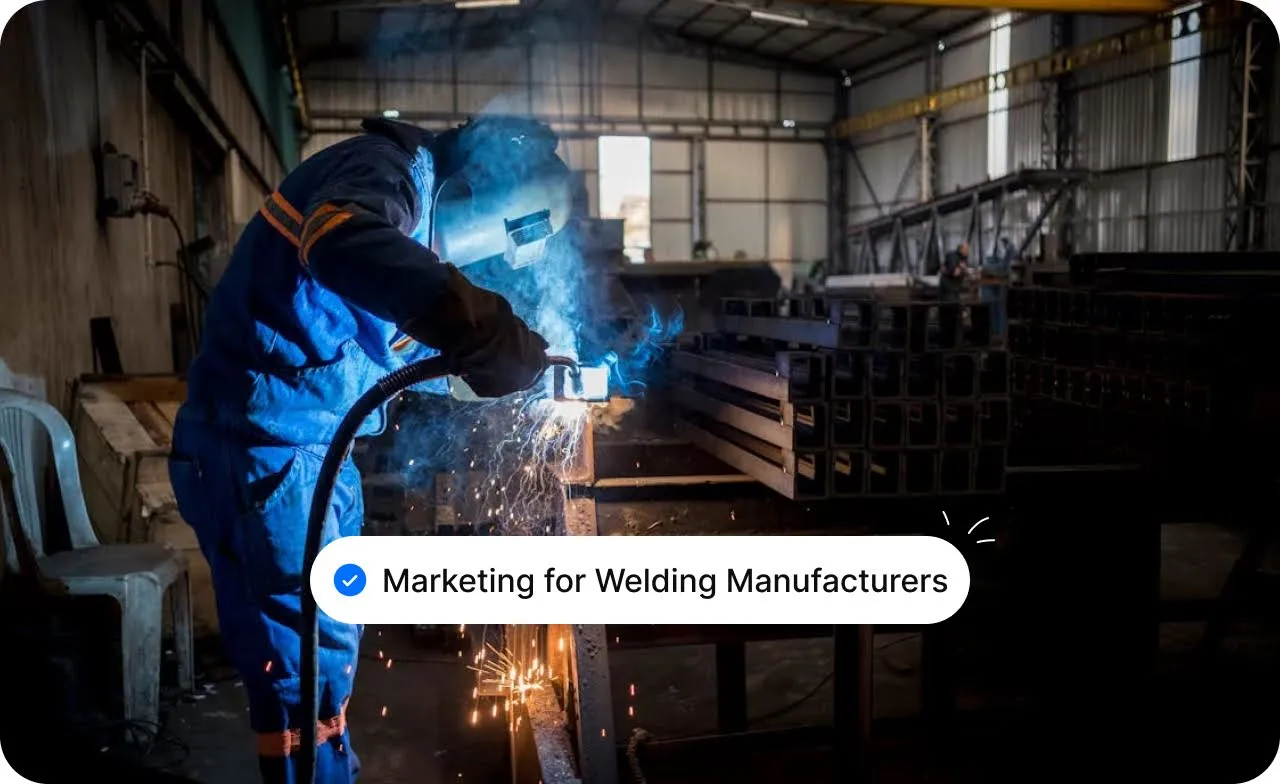




.webp)
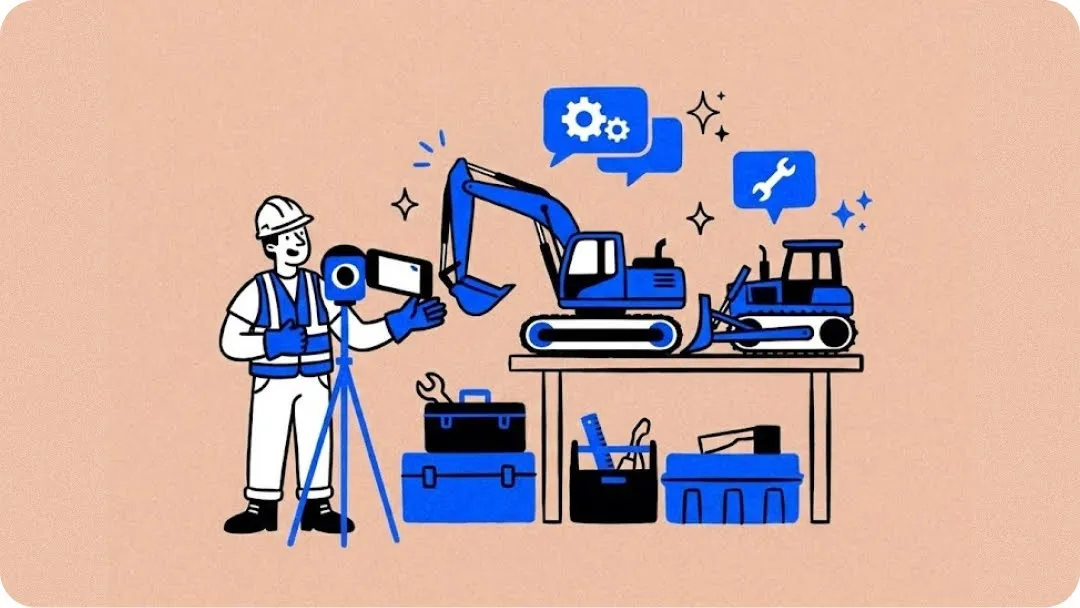







.webp)
.svg)


.svg)
.svg)
.svg)



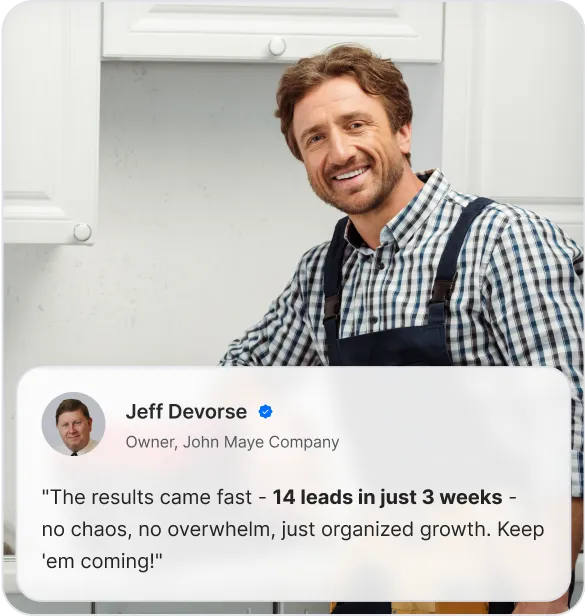
.svg)


